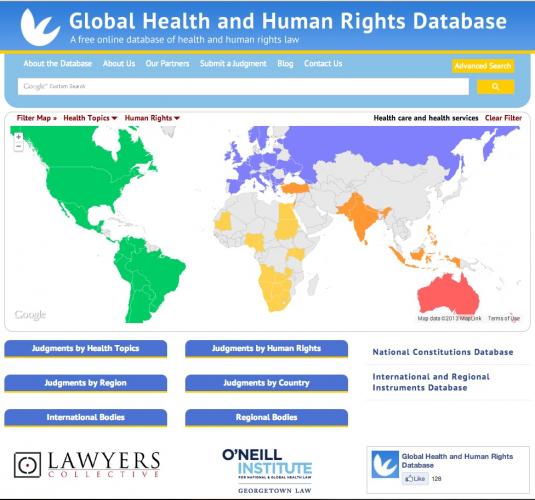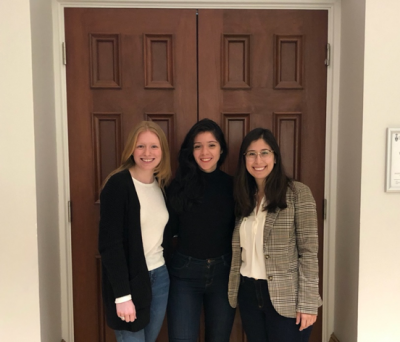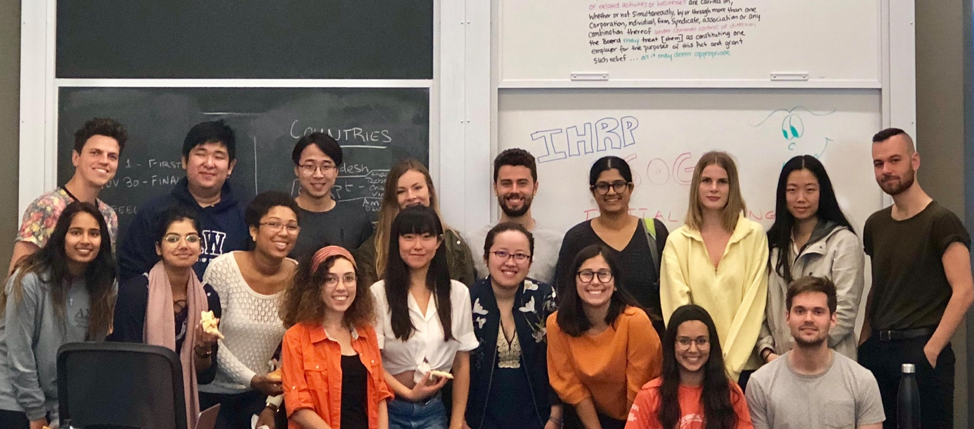Secondary menu
Spotlight on IHRP Working Groups
By Emily Tsui (3L JD/MGA), with contributions from Keith Garrett (2L), Cailyn Prins (2L),
Andrea Das-Wieczorek (2L), and Claire Phillips (2L).
The International Human Rights Program’s Working Groups play a crucial role in increasing access to justice for vulnerable groups and spreading awareness on a range of human rights issues globally. Each year, student volunteers at the Faculty of Law, in partnership with various organisations in Toronto and around the world, work on different projects to advance these causes.
We are fortunate to have students working on four projects this year: Advancing Global Health and Human Rights, Sexual Orientation and Gender Identity Country-Conditions Reports, Women's Human Rights Resources, and Digital Verification Corps. Rights Review profiled the Digital Verification Corps in the September edition of this year as part of its coverage of the summit in Hong Kong.
We are pleased to present an end of semester update for the Advancing Global Health and Human Rights, Sexual Orientation and Gender Identity Country-Conditions Reports and Women's Human Rights Resources working groups in this edition.
Advancing Global Health and Human Rights
Partner Organization: Lawyer's Collective, India
Student Leaders: Andrea Das-Wieczorek (2L) and Claire Phillips (2L)
It might be a rash or a runny nose, but you’ve likely gone to Google to research your symptoms. Now imagine you are a citizen in a country, unsure you have access to healthcare and wanting to challenge the state’s policies. Where would you turn? For many lawyers, citizens, and academics seeking to learn more about health-related and human rights case law to support their own legal arguments, they search the Global Health and Human Rights Database, a free, comprehensive research database comprising of summaries of judicial decisions made by courts across international jurisdictions. The database is managed by Lawyers Collective, a leading public interest NGO in India, in conjunction with the O’Neill Institute for National and Global Health Law at Georgetown University Law Center; however, its content is supplemented by over 100 global partners, including NGOs, academics, private researchers, and university programs, including the International Human Rights Program’s working group on Advancing Global Health and Human Rights.

Global Health and Human Rights Database.
To be included on the database, the summarized case must relate to the right to health or the right to enjoy the highest attainable standard of physical and mental health without discrimination. For many volunteers, joining the working group on Advancing Global Health and Human Rights is a great opportunity to develop legal research and writing skills. By asking volunteers to find cases related to health rights, it emphasizes that researching international case law can be incredibly challenging depending on the state of judicial records in particular regions. “We ask students to find the cases they wish to summarize partly because we want them to be interested in the health related topic, but also to put them in the shoes of someone who wants to bring a legal claim against a state. It is often difficult to find cases exactly on point to particular issues, which emphasizes the need for a centralized, searchable database to help overcome access to justice barriers,” said Andrea Das-Wieczorek, one of the working groups co-leaders. Once the cases have been summarized, the students tag each case using the unique system of health-related and human rights topics invoked in the case, making each summary readily catalogued on the database.
Because health is a universal right, the cases that are included in the database often share many commonalities that transcend jurisdictions and highlight the intersectionality between different areas of law. “The interdisciplinary aspects of the right to health is what really attracted me to this group. Last year I was particularly interested by a case concerning the pollution caused by a state-owned coal mine in Ukraine, denying the community’s access to a clean water supply. The court’s reasoning addressed water contamination, environmental concerns, and state obligations concerning health-related rights, and to me was an excellent example of the interdisciplinary concerns of this area of law,” said Claire Phillips, another of the group’s co-leaders. “For me, the most interesting case I summarized last year was a constitutional challenge from Zambia of that country’s Mental Disorders Act, which essentially allowed families of people diagnosed with mental disorders to have them forcibly detained in dilapidated state-run hospitals, stripping them of many of their protected rights. Such legislation would not survive a section 1 analysis under the Oakes test, but in Zambia, in the absence of a robust judiciary, the court felt it needed to give deference to the government in drafting such legislation,” added Ms. Das-Wieczorek. This year, the student volunteers will summarize a range of cases, including ones related to inhumane prison conditions, the right to refuse medical treatment, and access to therapeutic abortions.
The Advancing Global Health and Human Rights Working Group is grateful for its members contributing case summaries to build the database this year: Sung An, Laksmiina Balasubramaniam, Anson Cai, Elspeth Gibson, Andrew Gong, Elgar Gong, Bryan Hsu, Dylan Juschko, Katie Lawless, Zhen Lin, Flint Patterson, Ainslie Pierrynowski, Wendy Shin, Sofia Sugumar, Haris Yaqeen, and Bryan Yau.
Sexual Orientation and Gender Identity Country-Conditions Reports
Partner Organization: Refugee Lawyer's Association of Ontario
Student Leaders: Cailyn Prins (2L), Daiana Kostova (2L), and Linda Yang (2L JD/MBA)
 Student Leaders of the Sexual Orientation and Gender Identity (SOGI) Working Group. Photo Credit: Cailyn Prins.
Student Leaders of the Sexual Orientation and Gender Identity (SOGI) Working Group. Photo Credit: Cailyn Prins.
The International Human Rights Program’s Sexual Orientation and Gender Identity (SOGI) Working Group was formed to address the persecution faced by sexual minorities around the world and has been in operation for over ten years. The group creates and periodically updates country-specific reports on the status of LGBTQ+ protections, as well as the overall treatment of LGBTQ+ people in various countries. The national reports are intended to assist immigration and refugee lawyers when researching and compiling cases for individuals who seek refugee status in Canada. To date, the SOGI group has published reports pertaining to 42 different countries which have been downloaded thousands of times.
The substance of the national reports goes beyond relevant legislative provisions to include Canadian jurisprudence, governmental and non-governmental reports and scholarship, as well as media accounts of how LGBTQ+ persons are viewed and treated in the jurisdiction. By conducting research across these different sources, SOGI members compile the information into reports which provide a more comprehensive vantage point from which to view discriminatory experiences of the LGBTQ+ community in a given country.
This year, the SOGI group is working to create two new country reports as well as update two reports in light of recent circumstantial changes. The countries of focus are Mexico, Brazil, Lebanon and India. Mexico and Brazil are being updated, while new reports are being created for Lebanon and India. The focus of this year’s reports is on countries which may not have explicitly discriminatory legislation but may nonetheless have discriminatory social climates. For example, India’s landmark Supreme Court decision last year deemed the criminalization of consensual same-sex relations unconstitutional, with the Court stating that “discrimination on the basis of sexuality amounts to a violation of fundamental rights.” However, it remains to be seen how this ruling will impact the experiences of LGBTQ+ people in the country, and SOGI seeks to compile information on treatment of individuals before and after this case.
 Members of the Sexual Orientation and Gender Identity (SOGI) Working Group. Photo Credit: Cailyn Prins.
Members of the Sexual Orientation and Gender Identity (SOGI) Working Group. Photo Credit: Cailyn Prins.
SOGI invites students of all years to sign up in September to conduct research for the academic year. Students gain exposure to human rights issues around the world while gaining invaluable skills in conducting international research. Our dedicated team members this year are Temitope Ajibode, Lizzie Chen, Maija Fiorante, Asha Gordon, Logan Hale, Krishna Kilambi, Hannah Lank, Adrienne Ralph, Natalie Miller, Miah Nath, Min Hee Oh, Julia Raupp de Sa Pimentel, Ryan Riemenschneider, Natasha Williams, and Chandrasekar Venkataraman.
Women's Human Rights Resources
Partner Organization: Bora Laskin Law Library
Student Leaders: Shreeya Handa (3L), Haley Puah (3L), and Keith Garrett (2L)
 Created in 1995, the Women’s Human Rights Resources (WHRR) database has become a crucial tool for human rights defenders across the globe who use it to access cutting-edge academic research that was previously confined to law libraries which are often inaccessible to women in the Global South. The WHRR database provides annotations for key UN documents and leading scholarly articles on a range of topics from economic globalization to reproductive rights to armed conflict. The WHRR database receives more than 15,000 hits per month, with diverse users from over 100 countries. Students participating in the group can expect to research, cite and annotate articles on topics concerning women’s legal rights. Participation in the group is an effective and rewarding way to develop legal research and writing skills outside of the classroom on important and interesting topics.
Created in 1995, the Women’s Human Rights Resources (WHRR) database has become a crucial tool for human rights defenders across the globe who use it to access cutting-edge academic research that was previously confined to law libraries which are often inaccessible to women in the Global South. The WHRR database provides annotations for key UN documents and leading scholarly articles on a range of topics from economic globalization to reproductive rights to armed conflict. The WHRR database receives more than 15,000 hits per month, with diverse users from over 100 countries. Students participating in the group can expect to research, cite and annotate articles on topics concerning women’s legal rights. Participation in the group is an effective and rewarding way to develop legal research and writing skills outside of the classroom on important and interesting topics.
The WHRR Working Group is grateful for its members contributing on the project this year: Lucy Yao, Alexandra Hoi Yin Cheung, Sabrina Sukhdeo, Hannah Bourgeois, Safa Bajwa, Madison Kerr, Matthew Cunningham, Manula Adhihetty, Karen (Xiaoying) Jia, Ifrah Farah, Jessica Commanda, Yuxuan Wu, Rachel Allen, and Yan Cheng.
